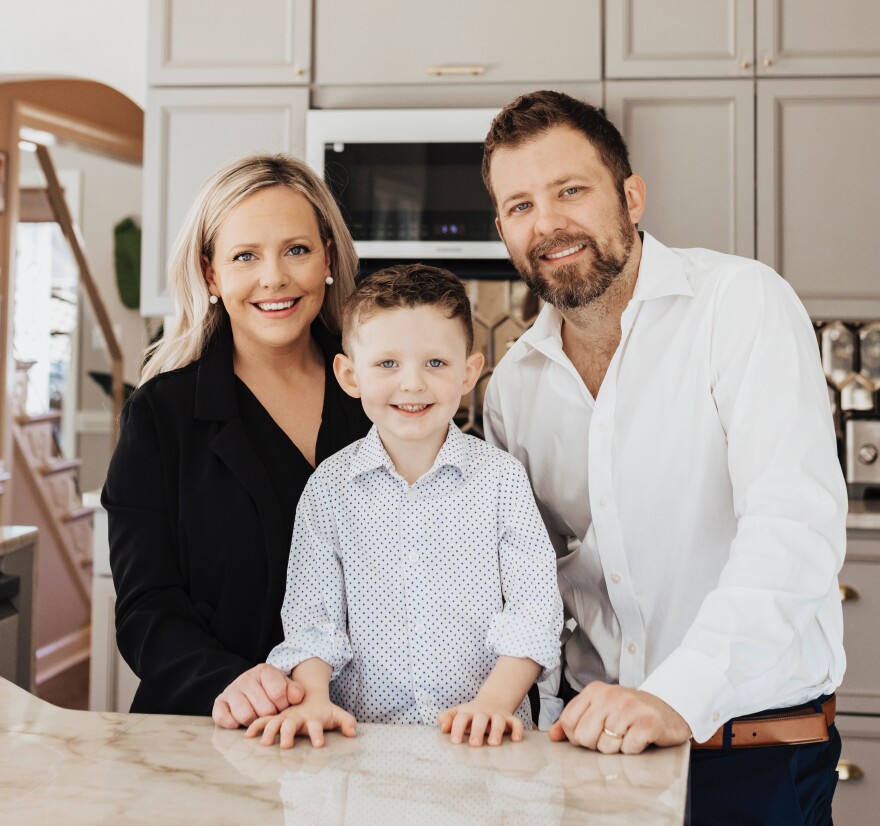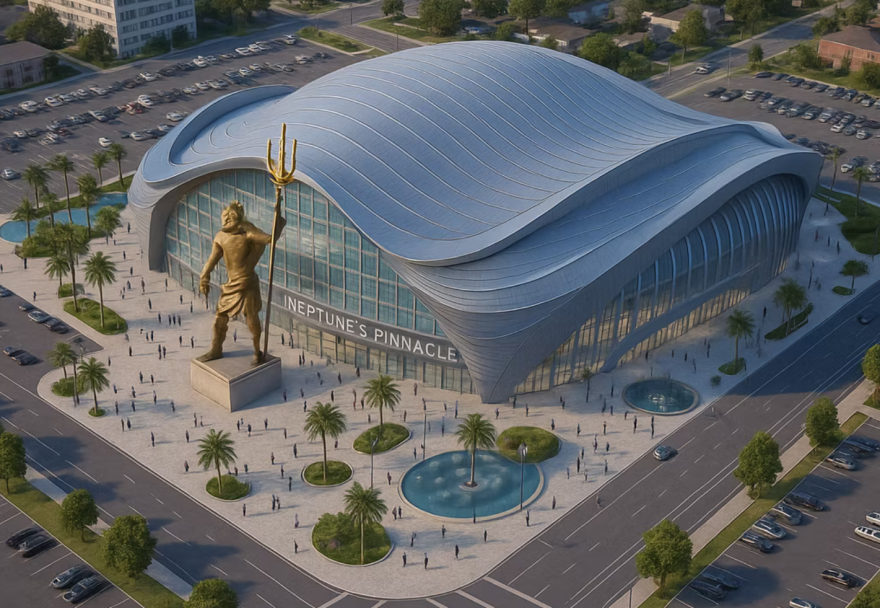In June, Coleman Ferguson was driving home to Virginia Beach after seeing comedian Nate Bargatze at the Norfolk Scope when an idea took shape.
Ferguson said it irked him to make the trip to the Scope or across the bridge to the Hampton Coliseum to see major sports events or big indoor performances.
“I've seen it, talked about my whole life, and I'm like, ‘Why don't we have it?’ And then, after my research, I'm like, ‘We should have an arena. We should have a sports team. This is just kind of silly,’” he said.
So Ferguson said he’ll do it himself.
He launched a website earlier this month with a vision for a 20,000-seat arena that would be made possible in part by crowdfunding from the community and wouldn’t rely on any money from the city.
The site includes several AI renderings of potential arenas, locations and even a mockup of uniforms for an NBA team – the Frogmen, tying it in with the region’s military pedigree.
Ferguson said he’s a big sports fan. Virginia Beach is one of the biggest cities — and Hampton Roads, one of the largest metro areas — without a major league sports team, despite the area turning out home-grown talent in just about every major sport.
Virginia Beach already has the 20,000-seat Veterans United Home Loans Amphitheater, but Ferguson said an outdoor venue like that can’t attract the kinds of shows with big productions that major artists like Beyoncé are putting on now.
The 36-year-old told WHRO he has no experience with development or projects of this scale. He runs a wedding venue in Virginia Beach called Gala 417, as well as Superheroes Ice Cream near Lynnhaven Mall. He went to Princess Anne High School, got his GED and never went to college.
But he argues his passion for the project makes him the right person for the job.
“While everybody's sleeping, I'm reading more articles. I'm reading how arenas generate revenue, reading about how sports teams relocated,” he said. “I sleep this project, I wake up and that's all I do is I study and do everything that I can to learn more about this project and how I can make it happen.”
So how does someone with no backing make a big enough splash to move this forward? Get the community in on it.
Ferguson wants to sell shares to locals to raise $80 million, and then use that to secure bank loans.
“That way, they have skin in the game. That'll make them want to attend events, and they could potentially make money off the profits that the arena makes, so to me, when you got that big of involvement, we can see the city really everybody getting behind it.”

He submitted his pitch to Virginia Beach’s economic development office.
He hasn’t started collecting any money yet — he’d have to file with the federal Securities and Exchange Commission to do the kind of stock sale in the business plan published online — but he said by mid-July he had more than $4 million pledged. Ferguson said what he's envisioning will cost somewhere around $700 million to develop.
Attracting a major arena — and a professional sports team to fill it — has long been a dream for many in Hampton Roads. But despite multiple false starts, that particular white whale has never been reeled in.
Virginia Beach got as far as having a deal in place with a developer to build an arena at the Oceanfront in 2017, but the effort fell apart when the developer failed to secure financing.
Seven years later, Ferguson thinks it’s time to try again.
Ferguson blamed the need for public funding or tax incentives from the city for tanking previous efforts and said his project shouldn’t need them.
“I don't think those really sat well overall. I think that put a lot of pressure on both parties involved, the city and the developers, and that's why they've all kind of crashed and burned over time,” he said.
He has, however, been talking with the city about using city-owned property, he said. They’re discussing lots at the Oceanfront and at other “opportunity zones.” Ferguson said he’s also spoken with private landowners who have expressed interest.
Operating an arena without a permanent tenant like a sports team is possible. Ferguson points to Oklahoma City’s Paycom Center, which was open for six years before the Seattle SuperSonics became the Oklahoma City Thunder and relocated in 2008.
Ferguson said he’s reached out to two different NBA teams to discuss possible relocations, but he can’t say more due to non-disclosure agreements. He also said he reached out to the National Hockey League’s San Jose Sharks. The team’s lease on its arena in San Jose is ending.
His website — some of which Ferguson said was written by artificial intelligence applications — lists several “Sponsors and Partners,” including Dominion Energy and Mortenson, an international arena development company. A representative from Dominion said the company “is not involved in the project.” A representative from Mortenson said the same, though Ferguson insisted he had been in touch with someone from Mortenson since the project launched, though he couldn’t recall the person’s full name. A representative from the company later confirmed, “No one from our Sports group is in contact with Coleman Ferguson.”
Ferguson said that the list of companies, which also included international sports and music event company AEG, was intended to be aspirational and show the kinds of companies that could partner with the Virginia Beach Arena Project, not a listing of groups actually signed on.
He also said he moved on from Mortenson and is now talking to Manhattan Construction Group, which built AT&T Stadium in Dallas, where the NFL’s Cowboys play.


